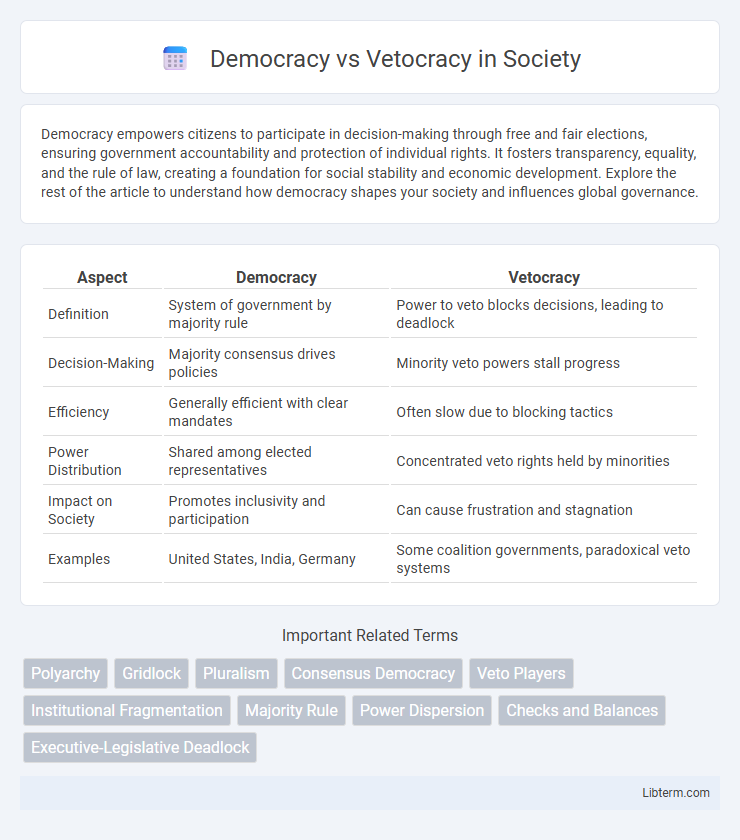Democracy empowers citizens to participate in decision-making through free and fair elections, ensuring government accountability and protection of individual rights. It fosters transparency, equality, and the rule of law, creating a foundation for social stability and economic development. Explore the rest of the article to understand how democracy shapes your society and influences global governance.
Table of Comparison
| Aspect | Democracy | Vetocracy |
|---|---|---|
| Definition | System of government by majority rule | Power to veto blocks decisions, leading to deadlock |
| Decision-Making | Majority consensus drives policies | Minority veto powers stall progress |
| Efficiency | Generally efficient with clear mandates | Often slow due to blocking tactics |
| Power Distribution | Shared among elected representatives | Concentrated veto rights held by minorities |
| Impact on Society | Promotes inclusivity and participation | Can cause frustration and stagnation |
| Examples | United States, India, Germany | Some coalition governments, paradoxical veto systems |
Defining Democracy and Vetocracy
Democracy is a system of government where power is vested in the people, who exercise it directly or through elected representatives, emphasizing majority rule and individual rights. Vetocracy is a political framework where multiple veto points empower various stakeholders to block decisions, often leading to gridlock and inefficiency. While democracy aims for collective decision-making, vetocracy prioritizes checks and balances that can hinder policy implementation.
Historical Origins and Evolution
Democracy originated in ancient Athens around the 5th century BCE, emphasizing direct participation of citizens in governance, whereas vetocracy emerged as a modern concept describing systems where multiple veto points allow actors to block decision-making. The evolution of democracy saw adaptation through representative institutions and expanded suffrage, while vetocratic tendencies increased in complex political systems to prevent the concentration of power and protect minority interests. Historical shifts highlight democracy's focus on majority rule contrasted with vetocracy's mechanism for dispersed authority and heightened checks and balances.
Key Principles of Democracy
Democracy is founded on key principles such as popular sovereignty, political equality, and majority rule while protecting minority rights through the rule of law. It emphasizes transparent decision-making processes, accountability of elected representatives, and the protection of individual freedoms and civil liberties. Unlike vetocracy, where multiple actors hold veto power stalling progress, democracy facilitates collective action and policy implementation through inclusive participation and negotiated consensus.
Fundamental Features of Vetocracy
Vetocracy fundamentally relies on the power of veto held by multiple stakeholders, which can paralyze decision-making and hinder effective governance. Unlike democracy, where majority rule drives policy and progress, vetocracy empowers minority vetoes that block actions and stall reforms. This system often results in gridlock, decreasing transparency and accountability, and undermining the ability to address complex social, economic, or political challenges efficiently.
Decision-Making Processes Compared
Democracy emphasizes collective decision-making through majority rule and elected representatives, ensuring citizens have a voice in shaping policies. Vetocracy, in contrast, involves multiple overlapping veto points, where diverse stakeholders can block decisions, often leading to policy gridlock. This fragmentation in vetocracy slows governance, whereas democracy facilitates more streamlined decision implementation.
Strengths and Weaknesses of Democracy
Democracy's strength lies in its ability to represent diverse voices through free elections and promote accountability by allowing citizens to influence government decisions, fostering collective decision-making and protecting individual rights. However, its weaknesses include the risk of majority rule overshadowing minority interests, potential slow decision-making processes due to consensus requirements, and vulnerability to populism or misinformation that can undermine informed public participation. These factors highlight democracy's balance between inclusive governance and the challenges of managing competing interests and ensuring effective policy implementation.
The Pitfalls of Vetocracy
Vetocracy undermines efficient decision-making by granting excessive veto power to multiple stakeholders, which leads to deadlock and policy paralysis. This system fosters conflict and delays reforms, as opposing vetoes prevent consensus and hinder timely implementation of vital changes. Consequently, vetocracy impairs democratic governance by prioritizing obstruction over collaboration and progress.
Real-World Examples and Case Studies
Democracy promotes majority rule and accountability, as seen in countries like the United States and India, where electoral processes enable citizen participation and government responsiveness. Vetocracy occurs when multiple veto points, such as legislative deadlock in the U.S. Senate or Belgium's complex federal system, stall decision-making and hinder policy implementation. Case studies from Brazil's political crises and Israel's coalition governments demonstrate how veto players can both protect minority interests and contribute to governance gridlock.
Impacts on Society, Governance, and Policy
Democracy fosters inclusive decision-making, enabling diverse citizen participation that strengthens social cohesion and accountability in governance, while vetocracy often leads to policy gridlock due to excessive veto powers that empower minorities to stall reforms. The societal impact of democracy includes enhanced public trust and legitimacy in institutions, whereas vetocracy can breed cynicism and disengagement by undermining effective governance. In policy terms, democracy facilitates adaptive and responsive legislation, contrasting with vetocracy's tendency to maintain the status quo and inhibit progress.
Future Prospects: Balancing Participation and Paralysis
Democracy's future prospects hinge on enhancing inclusive participation while preventing decision-making paralysis caused by excessive veto powers typical in vetocracies. Effective governance will require innovative institutional designs that balance minority rights with the need for timely policy implementation. Emphasizing transparent dialogue and adaptive frameworks can mitigate gridlock, fostering resilient democratic systems capable of addressing complex societal challenges.
Democracy Infographic

 libterm.com
libterm.com